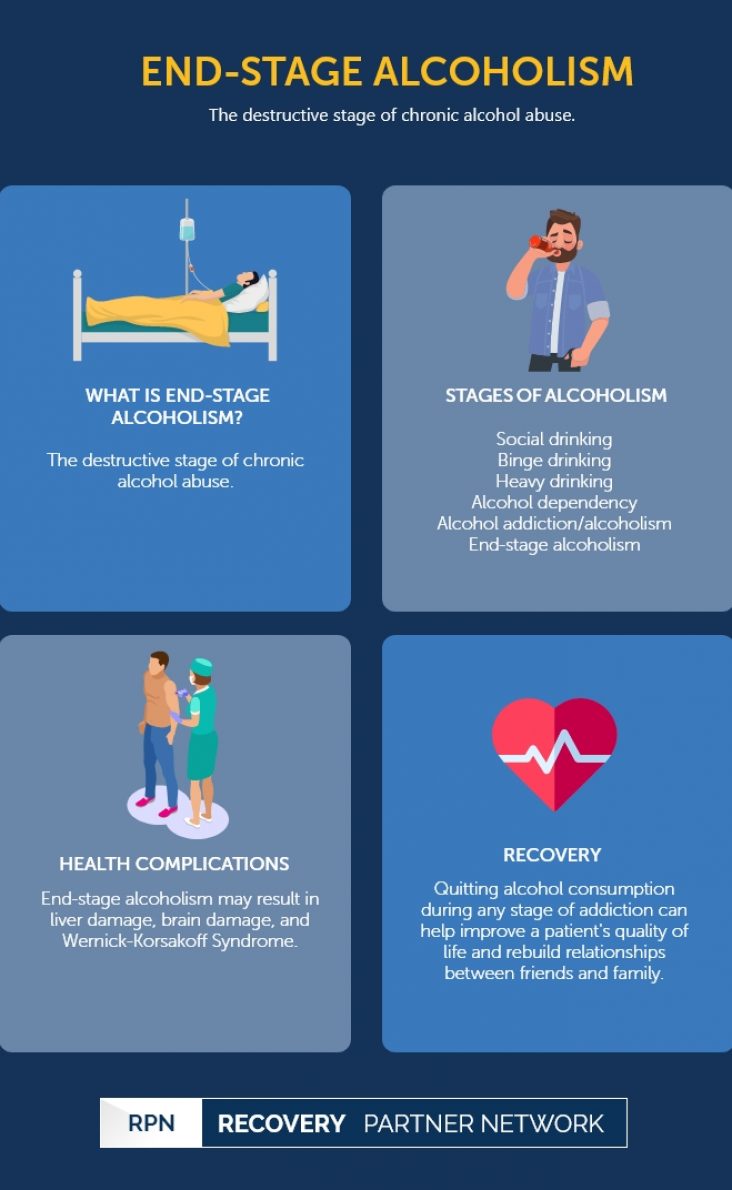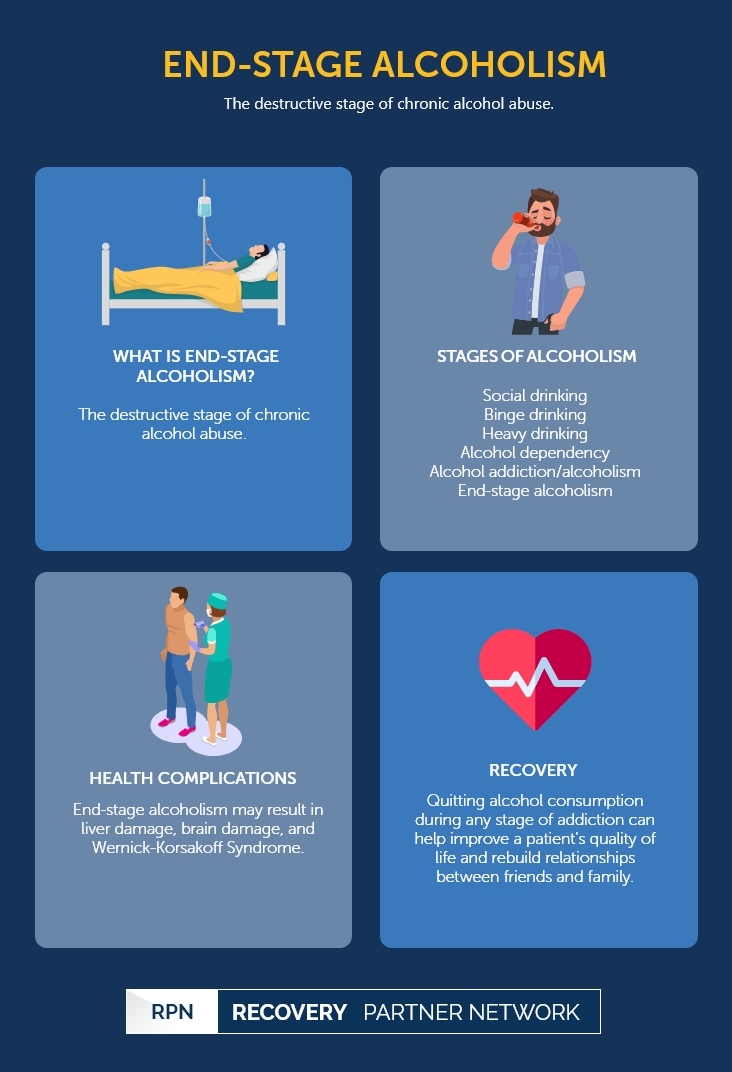The destructive stage of chronic alcohol abuse.
End-Stage Alcoholism
End-Stage Alcoholism | Table of Contents
What is End-Stage Alcoholism?
End-stage alcoholism is the concluding stage that occurs as a result of years of alcohol abuse. By the time an individual reaches this destructive stage, he/she would have developed a number of physical and psychological conditions in addition to alcohol addiction. At this stage of alcoholism, individuals may suffer from a wide range of irreversible health complications, strained or damaged relationships with friends and family, as well as a loss of financial stability.
The Stages of Alcoholism
Alcohol abuse manifests in many stages, such as:
- Social drinking
- Binge drinking
- Heavy drinking
- Alcohol dependency
- Alcohol addiction/alcoholism
- End-stage alcoholism
It has been estimated that 17 billion alcoholic drinks are consumed each year in the US. This estimation is greatly contributed to binge drinking as one in six Americans binge drink. Generally, binge drinking can lead to alcohol addiction over time.
Individuals who drink regularly or excessively in social settings are considered heavy drinkers. These individuals are likely to experience alcohol tolerance.
Individuals who develop alcohol dependence may find it hard to quit their consumption as they may experience withdrawal symptoms. During this stage, individuals may form physical or psychological dependence or both.
When an individual forms an addiction to alcohol, he/she may begin to display various behaviors that impact their health and personal relationships.
he final stage of alcoholism at which the individual may experience serious health and mental complications that may have fatal consequences.
FAQ
- What is the life expectancy of an alcoholic?
- How long can you live with end stage cirrhosis?
- Can stage four cirrhosis be reversed?
The average life expectancy for men with AUD is 47 to 53 years of age, while it is 50 to 58 years of age for women. Patients with AUD generally die between 24 to 28 years earlier than the general population.
The average life expectancy of a patient with end-stage cirrhosis is two years.
The damage caused by stage four cirrhosis cannot be reversed unless a patient undergoes a liver transplant.
End-Stage Alcoholism and Health Complications
End-stage alcoholism may bring about many health complications, of which the first stage may consist of liver damage. The accumulation of fats may eventually result in liver scarring (cirrhosis) or liver disease that may have fatal consequences. Since the liver is responsible for maintaining a healthy functioning body, any damage to it may result in other adverse health complications.
Health complications that may arise during end-stage alcoholism may include:
- Dementia
- Cancer
- Brain damage
- Hepatitis
- Heart problems
- Stroke
Alcoholic cardiomyopathy due to end-stage alcoholism requires immediate medical intervention.
Some of the warning signs of alcoholic cardiomyopathy are:
- Swollen feet, legs, or ankles
- Fatigue
- Labored breathing
- Dizziness
- Lack of appetite
- Feeling weak
- Irregular pulse/heart rate
FAQ
- Do alcoholics lose their appetite?
- How do you know if cirrhosis is getting worse?
- How long can an alcoholic live with cirrhosis?
Heavy drinking can suppress appetite as they produce calories.
Some of the signs of worsening cirrhosis include jaundice, vomiting of blood, and itchy skin.
Half of AUD patients with cirrhosis survive for two years, and only 35% survive for five years.
Wernicke-Korsakoff Syndrome and End-Stage Alcoholism
Wernicke-Korsakoff Syndrome (WKS), also known as alcohol dementia and wet brain, is a condition that occurs most frequently in end-stage alcoholism. This syndrome occurs as a result of vitamin B-1 deficiency, which manifests as traits similar to dementia.
The symptoms of Wernicke-Korsakoff Syndrome may include:
- Leg tremors
- Stumbling gait
- Vision changes
- Problems in maintaining balance
- Confusion
- Difficulty in learning new things
- Drooping lids
- Hallucinations
- Double vision
Wernicke-Korsakoff Syndrome is a combination of two separate syndromes, namely Wernicke’s Encephalopathy and Korsakoff’s psychosis. The National Institute on Alcohol Abuse and Alcoholism (NIAAA) estimates that around 90 percent of alcoholics experiencing Wernicke’s Encephalopathy go onto develop Korsakoff’s psychosis over time.
Early Signs of Liver Disease From Alcoholism
There are many visible health conditions that occur during end-stage alcoholism, such as jaundice from liver failure, as well as subtle signs such as itchy skin, fluid retention, bleeding, and fatigue that may signify another underlying health complication.
End-Stage Alcoholism Recovery
Alcoholism at any stage can be overcome through the right treatment program and support. Even if the addiction has caused serious and irreversible damage to the patient’s health, quitting alcohol can significantly help a patient during their final stage of life or even extend their life a little longer. Recovery from alcoholism can also give the patient the opportunity to mend broken relationships and take back control of their life. However, the length of the individual’s life depends on a range of factors such as the extent of the damage, the quality of medical care, and the willingness of the individual to fight the addiction.
Recovery Partner Network
We aim to educate and empower. If you feel our library of resources does not cover your specific need, reach out to us, and we would be happy to help.
STATISTICS
© Copyright 2026


